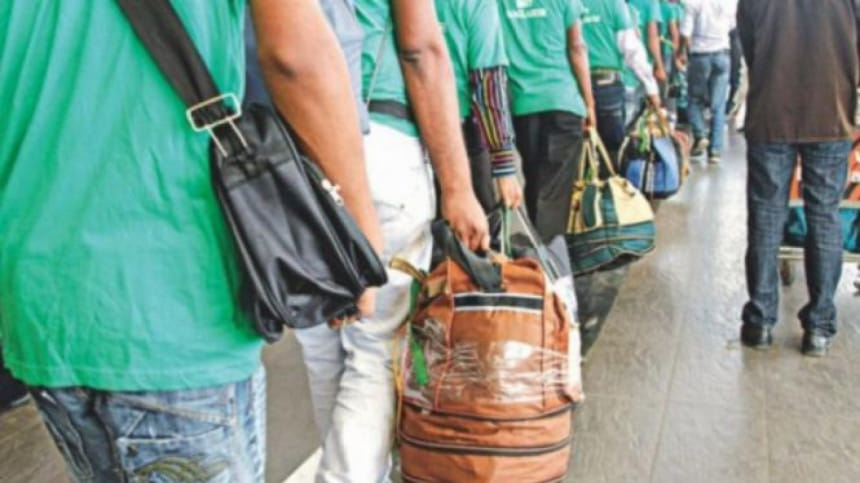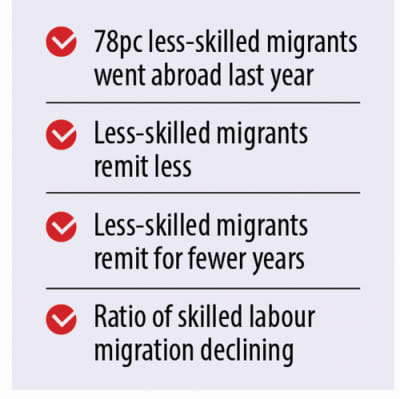Skill factor hinders rise in remittance


Despite sending well over a million migrants abroad last year, Bangladesh is unlikely to get the desired remittance from them as almost four out of five of them were less skilled.
The government categorises migrants who go abroad with jobs like domestic helps, janitors, gardeners, farm workers, and shepherds as less skilled.
Labour migration experts said less-skilled workers get poor wages compared to skilled workers and they blamed the government for not prioritising skilled migration, which could have eased the foreign currency crisis the country is going through now. Last fiscal year, Bangladesh got $21b in remittance.
According to an International Organisation for Migration (IOM) survey, less-skilled workers remit less per year and work fewer years abroad.
The data of Bureau of Manpower, Employment and Training (BMET) shows a record 11.35 lakh workers went abroad last year as economies started opening up with the easing of the Covid crisis.
Analysing government data, Refugee and Migratory Movements Research Unit (RMMRU) in its 2022 Migration Trends Report said about 78.64 percent of workers who migrated last year were less skilled. It was 75.24 percent the year before.
It said last year about 3.26 percent of the workers were semi-skilled -- like tailors, construction workers, and light machine operators.
At least 17.76 percent of the migrants were skilled -- like garment workers, drivers, mechanics, heavy machine operators and people who can work in the manufacturing sector.
Less than one percent of the migrants were professionals -- like medical professionals, engineers, and teachers.
The IOM conducted a survey on 1,000 remittance-receiving homes in 2020 and found that over the previous decade, skilled migrants on average sent home Tk 2.55 lakh a year whereas less-skilled ones sent Tk 1.55 lakh.
The skilled workers send money to their wives on average for 10 years before returning home but the less-skilled workers send money for six years, it found.
Prof CR Abrar, executive director of the RMMRU, said apart from earning less, less-skilled workers often face challenges like fraudulence. They pay hefty amounts to go abroad and many become unable to recoup the money spent.
Considering various recent economic shocks, remittance has now become even more crucial and "almost a lifeline" for the country's economy but there is no qualitative change in sending skilled workers abroad, he said.
Bangladesh has so far been unsuccessful in giving its migrants the required skill sets that not only bring in higher remittance but also provide protection to migrants.
He also said there appears to be a nominal difference between a semi-skilled and a less-skilled worker.
Syed Saiful Haque, chairman of Warbe Development Foundation, which works for migrants' rights, said in many cases, Bangladeshi workers are not given the promised jobs in host countries.
"Those who get jobs earn less. As a result, we don't see much improvement in terms of getting remittance," he added.
Shakirul Islam, chairperson of Ovibashi Karmi Unnayan Programme (Okup), said Bangladesh has traditionally been sending workers who can do "3D jobs" (dirty, dangerous, and difficult).
He said in most cases, the workers go abroad following the "purchase of visa, known as visa trading". This group of migrants are more inclined towards low-skill jobs.
Stressing the need for more initiative on enhancing workers' skills, Shakirul said the government needs to upgrade its training courses and also encourage labour receiving-countries to invest in skills training in Bangladesh so that they can hire more skilled workers from here.
RATIO OF SKILLED MIGRATION DROPPING
Of the 4.99 lakh workers who migrated in 2019-2020 fiscal year, 33.3 percent or 1.66 lakh were skilled, according to the expatriates' welfare ministry.
The following year, which was affected by the pandemic, 2.71 lakh migrated and 22.68 percent or 61,690 of them were skilled.
In 2021-2022, about 9.66 lakh migrated and of them 20.4 percent or 1.97 lakh were skilled.
Seeking anonymity, a leader of the Bangladesh Association of International Recruiting Agencies said they receive more demand letters for less-skilled and semi-skilled workers than skilled workers from Middle East countries, where Bangladeshis migrate the most.
However, Bangladesh, the sixth largest source country of international migrants, has the scope for sending more skilled workers there despite the fact that the market is being catered by the Philippines and India, the leader said.
Shakirul Islam of Okup said there is a demand for skilled workers in many countries and Bangladesh needs to identify those and train aspirant migrants accordingly.
Prof Abrar said with the easing of the pandemic, tourism and hospitality sectors are now thriving again in many countries.
He said Bangladesh should take steps to tap into this potential.
Senior Secretary Ahmed Munirus Saleheen of the expatriates' welfare ministry said different institutions under the ministry are active in workers' skills development. The ministry itself is aligned with the National Skills Development Authority, he said.
According to the 2021-2022 report of the expatriates' welfare ministry, at least 64 technical training centres and six institutes of the marine technology under the guidance of the ministry provide aspirant migrants, and whoever wants it, training on 55 different trades.
The ministry website says 86,437 people got training at those institutes in 2021-2022 fiscal.
Saleheen, however, said the migration of skilled workers has not been as per expectations. "One reason could be that those who are migrating lack the interest in gathering skills before migration," he added.
He urged aspirant migrant workers to undergo institutional training before migration. Skills ensure both money and dignity, he said.
Saleheen, however, refused to comment on RMMRU findings but said the data of RMMRU could be "authentic".

 For all latest news, follow The Daily Star's Google News channel.
For all latest news, follow The Daily Star's Google News channel. 








Comments